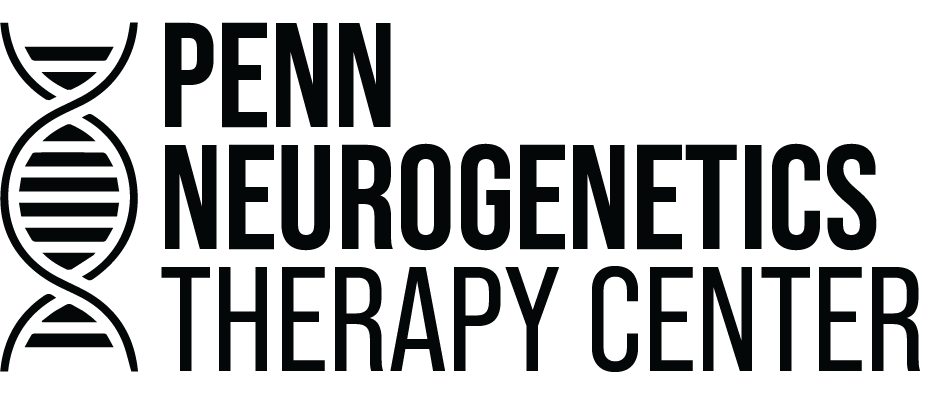Clinical Trials
The Penn Neurogenetics Therapy Center (PNTC) partners with both Penn investigators and biomedical companies to deliver early phase clinical trials of novel genetic-based therapies to patients with neurological disorders. The center leverages Penn resources and streamlines internal startup operations to efficiently establish and conduct first-in-human clinical trials with the highest standards of care and research. Our team of trialists, operations specialists, and supporting clinical research staff provides focused, coordinated expert care and management. To conduct complex, multi-disciplinary studies, we rely on well-established collaborations with other centers, departments and clinical entities at Penn. Since PNTC’s launch in March 2020, we have been conducting clinical trials of gene and molecular therapies for several neurological indications, including ALS, Charcot-Marie-Tooth type 1A (CMT1A), facioscapulohumeral muscular dystrophy (FSHD), epilepsy, FTD, HD, myasthenia gravis (MG), myotonic dystrophy type 1 (DM1), PD and spinocerebellar ataxia (SCA). We are completely committed to bringing precision gene-based medicine to our patients.
Our Trials
| Clinical Trial | Therapy Type | Sponsor | Principal Investigator |
|---|---|---|---|
|
A Phase 1/2a Open-Label Ascending Dose Study to Evaluate the Safety and Effects of LY3884961 in Patients With Parkinson's Disease With at Least One GBA1 Mutation (PROPEL) |
Viral Vector-Based Gene Therapy (AAV) | Prevail Therapeutics, a wholly-owned subsidiary of Eli Lilly and Company | Andres Deik Acosta Madiedo, MD |
|
A Phase 1/2 Ascending Dose Study to Evaluate the Safety and Effects on Progranulin Levels of PR006A in Patients with Frontotemporal Dementia with Progranulin Mutations (FTD-GRN) (PROCLAIM) |
Viral Vector-Based Gene Therapy (AAV) | Prevail Therapeutics, a wholly-owned subsidiary of Eli Lilly and Company | David Irwin, MD |
|
A Phase 1b Open-Label, Multicenter, Dose-Escalation Study to Assess the Safety, Tolerability, and Pharmacodynamic Effects of a Single Dose of PBFT02 Delivered into the Cisterna Magna (ICM) of Adult Subjects with Frontotemporal Dementia (FTD) and Mutations in the Progranulin Gene (GRN) (upliFT-D) |
Viral Vector-Based Gene Therapy (AAV) | Passage Bio, Inc. | David Irwin, MD |
|
A Phase 2, Randomized, Double-blind, Sham Surgery-controlled Study of the Efficacy and Safety of Intraputaminal AAV2-GDNF in the Treatment of Adults with Moderate Stage Parkinson’s Disease (REGENERATE-PD) |
Viral Vector-Based Gene Therapy (AAV) | Asklepios Biopharmaceutical, Inc. | Andres Deik Acosta Madiedo, MD |
|
A Multi-center, Phase 1/2a, First-in-human (FIH) Study Investigating the Safety, Tolerability, and Efficacy of AMT-260 in Adults With Unilateral Refractory Mesial Temporal Lobe Epilepsy (MTLE) Administered Via Magnetic Resonance Imaging (MRI)-Guided Convection-enhanced Delivery (CED) (GenTLE) |
Viral Vector-Based Gene Therapy (AAV) | uniQure France SAS | Mike Gelfand, MD, PhD |
|
A Phase 1/2, Multicenter, Single Ascending Dose Study to Evaluate the Safety, Tolerability, and Exploratory Efficacy of Intrathecally Administered Gene Therapy AMT-162 in Adult Participants with SOD1 Amyotrophic Lateral Sclerosis (SOD1-ALS) (EPISOD1) |
Viral Vector-Based Gene Therapy (AAV) | UniQure Biopharma B.V. | Colin Quinn, MD |
|
A Phase 3b Study to Evaluate Higher Dose Nusinersen (BIIB058) in Patients with Spinal Muscular Atrophy Previously Treated with Risdiplam (ASCEND) |
RNA-Based Gene Therapy | Biogen, Inc. | Lauren Elman, MD |
|
A Randomized, Double-blind, Placebo-controlled, Phase 1/2 Study to Evaluate the Safety, Tolerability, Pharmacokinetics, Pharmacodynamics, and Exploratory Efficacy of AOC 1020 Administered Intravenously to Adult Participants with Facioscapulohumeral Muscular Dystrophy (FSHD) (FORTITUDE) |
RNA-Based Gene Therapy | Avidity Biosciences, Inc. | Colin Quinn, MD |
|
A Phase 2 Open-label Extension Study to Evaluate the Long-Term Safety, Tolerability, Efficacy, and Pharmacokinetics of AOC 1020 Administered Intravenously to Adult Participants With Facioscapulohumeral Muscular Dystrophy (FSHD) (FORTITUDE-OLE) |
RNA-Based Gene Therapy | Avidity Biosciences, Inc. | Colin Quinn, MD |
|
A Phase 3 Randomized, Double-Blind, Placebo-Controlled, Global Study to Evaluate the Efficacy and Safety of Intravenous Delpacibart Etedesiran (abbreviated del-desiran, formerly AOC 1001) for the Treatment of Myotonic Dystrophy Type 1 (HARBOR) |
RNA-Based Gene Therapy | Avidity Biosciences, Inc. | Lauren Elman, MD |
|
A Phase 1/2, Randomized, Double-blind, Placebo‑controlled Single- and Multiple‑dose Escalation Study Evaluating the Safety, Tolerability, Pharmacokinetics, and Pharmacodynamics of VX‑670 in Adult Subjects with Myotonic Dystrophy Type 1 (GALILEO) |
RNA-Based Gene Therapy | Vertex Pharmaceuticals Inc. | Lauren Elman, MD |
|
A Phase 2, Randomized, Double-blind, Placebo-controlled Study to Evaluate the Efficacy, Safety, Tolerability, and Pharmacodynamics of Intrathecally Administered ALN-APP in Patients with Cerebral Amyloid Angiopathy (CAA; cAPPricorn-1) |
RNA-Based Gene Therapy | Alnylam Pharmaceuticals | Scott Kasner, MD |
|
Autologous T-Cells Expressing A Chimeric Antigen Receptor Directed To B-Cell Maturation Antigen (BCMA) In Patients With Generalized Myasthenia Gravis (MG) (DESCARTES-08) |
RNA Cell Therapy | Cartesian Therapeutics | Chafic Karam, MD |
| Clinical Trial | Therapy Type | Sponsor | Principal Investigator |
|---|---|---|---|
|
A Phase 1/2 Multiple-Ascending-Dose Study With a Long-Term Open-Label Extension to Assess the Safety, Tolerability, Pharmacokinetics, Pharmacodynamics, and Effect on Disease Progression of BIIB105 Administered Intrathecally to Adults With Amyotrophic Lateral Sclerosis With or Without Poly-CAG Expansion in the Ataxin-2 Gene (ALSpire) |
RNA-Based Gene Therapy | Biogen, Inc. | Lauren Elman, MD |
|
A Phase 1 Single- and Multiple-Ascending-Dose Study to Assess the Safety, Tolerability, and Pharmacokinetics of BIIB094 Administered Intrathecally to Adults With Parkinson's Disease (REASON) |
RNA-Based Gene Therapy | Biogen, Inc. | Andrew Siderowf, MD |
|
A Phase 1, Blinded, Randomized, Placebo-controlled Study to Investigate the Safety, Tolerability, and Pharmacokinetics of Multiple Ascending Doses of BIIB132 Administered Intrathecally to Adults With Spinocerebellar Ataxia 3 (MERA) |
RNA-Based Gene Therapy | Biogen, Inc. | Ali Hamedani, MD, MHS |
|
A Randomized, Double-Blind, Placebo-Controlled Dose Range Finding Study with Open-Label Extension to Evaluate the Safety, Tolerability, Pharmacokinetics and Pharmacodynamics of LMI070/branaplam when Administered as Weekly Oral Doses in Participants with Early Manifest Huntington’s Disease (VIBRANT-HD) |
RNA Splicing Molecule | Novartis | Aaron Lasker, MD |



